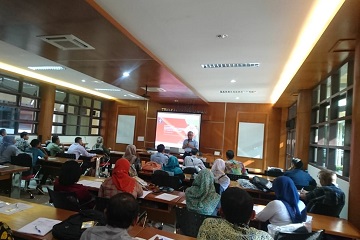IPB Provides Training for Lecturers IPB in Managing Hazardous (B3) Waste

Most of the waste produced from laboratories, pilot plants, animal hospitals, and workshops are included in the category of hazardous and toxic substances (B3). These wastes contain various types of chemicals which, after use, will be disposed of as waste without treatment.
This prompted the Directorate of Human Resources, Bogor Agricultural Institute (SDM IPB) in collaboration with the Faculty of Agricultural Technology (Fateta) IPB to conduct B3 Waste Processing Training aimed at educational staff in the IPB education laboratory held in the Fateta Meeting Room, IPB Campus Dramaga, Thursday (8/30).
"This training is intended to facilitate the units within IPB in developing existing human resources, especially in the processing of B3 waste, in order to be able to understand and implement B3 waste management techniques in the campus environment. Moreover, we see the campus needs that are currently required to manage B3 waste in accordance with the regulations and good operating standards," explained Prof. Dr. Ir. Slamet Budijanto, M.Agr, Deputy Dean of Resources, Cooperation and Development, Fateta IPB.
In the training, there were four speakers, each speaker giving special material about their respective services in B3 waste management including Prof. Nastiti S. Indrasti and Prof. Suprihatin. Prof. Nastiti explained the sources and characteristics of B3 waste in the campus environment as well as regarding regulations in handling waste. While Prof. Suprihatin explained the principles of B3 waste management on campus.
"This management of B3 waste really requires proper action, especially for toxic waste consisting of heavy metals. Every heavy metal has its own effects, some can damage the nervous system, damage the fetus, damage the respiratory system and so on. The processing of B3 waste can be done physically and chemically by changing the physical form and chemical properties by adding certain binding compounds and reagents which aim to reduce solubility or spread," said Prof. Nastiti.
Then Prof. Suprihatin added that the location of B3 waste must also be considered. "It can be done on campus as long as the location is free of flooding and is at least 50 meters away from public facilities. In addition, other security facilities are needed such as supervision, safety fences or warning signs and lighting and emergency response systems," she added.
The training was also supported by two field speakers when participants were invited to visit laboratories and fields, namely Angga Yudhistira, STP, MSi and Bambang Kuntadi, SP, MM.
Prof. Dr. Ir. Slamet Budijanto, M.Agr hopes that this training can increase awareness in managing B3 waste. "Of course this will be very beneficial not only to protect ‘the occupants or users’ and the campus environment of IPB but also for public learning facilities and to enhance a positive impression for IPB," he concluded. (RYS)



